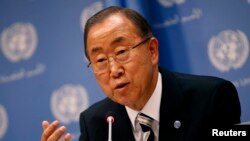U.N. Secretary-General Ban Ki-moon said the United Nations is "taking the lead" in efforts to combat the Ebola virus outbreak in West Africa.
He told reporters Tuesday that he and World Health Organization Director General Margaret Chan will outline an international plan on Thursday during an emergency meeting of the U.N. Security Council.
The council is due to vote the same day on a U.S.-drafted resolution calling on member states to quickly send aid, field hospitals and health workers to affected countries and lift travel restrictions to those areas.
Ban said the U.N. General Assembly will also hold a "high-level meeting" on the situation next week. He called the Ebola outbreak "an exponential crisis that demands an exceptional global response."
"Every day we delay, the cost and suffering will grow exponentially. We cannot allow bans on travel or transport to slow us down. We need isolation of people affected by Ebola -- not of nations struggling to cope with it," said Ban.
President Barack Obama announced Tuesday the deployment of thousands of U.S. troops meant to bolster health services in West Africa, where nearly 2,500 people have died from the outbreak.
The soldiers will be based in Monrovia, Liberia, and tasked with training medical workers, coordinating supplies and building new treatment facilities.
Obama said the U.S. military is in the best position to expedite the international response.
"We're prepared to take leadership on this to provide the kinds of capabilities that only America has, and to mobilize the world in a way that only America can do," said Obama.
He also said a quicker response from the international community is needed to stop the disease from infecting hundreds of thousands of people and to keep West African countries from political turmoil.
"This is an epidemic that is not just a threat to regional security, it's a potential threat to global security if these countries break down, if their economies break down, if people panic. That has profound effects on all of us, even if we are not directly contracting the disease," said Obama.
Meanwhile, U.S. doctor Kent Brantly, who contracted Ebola after treating patients in Liberia, was critical on Tuesday of the international response to the outbreak. As Obama met with health officials in Atlanta, Brantly said at a Congressional hearing in Washington that foreign governments only began paying attention to the outbreak when he and another U.S. healthcare worker became ill in July.
"Since that time, there has been intense media attention and increased awareness of the situation on the ground in West Africa. The response to date, however, has remained sluggish and unacceptably out of step with the scope and the size of the problem that is now before us," said Brantly.
Both Brantly and the other health worker received experimental treatments from a limited supply that was unavailable to other Ebola patients in West Africa. The U.S. government and pharmaceutical giant GlaxoSmithKline are currently testing a vaccine on 10 people in a federal facility near Washington.
A doctor testified at the same hearing on Tuesday that there were "no red flags" in the drug trial that began September 2.
The virus has infected an estimated 5,000 people in the largest Ebola outbreak ever, primarily in Guinea, Liberia and Sierra Leone.
